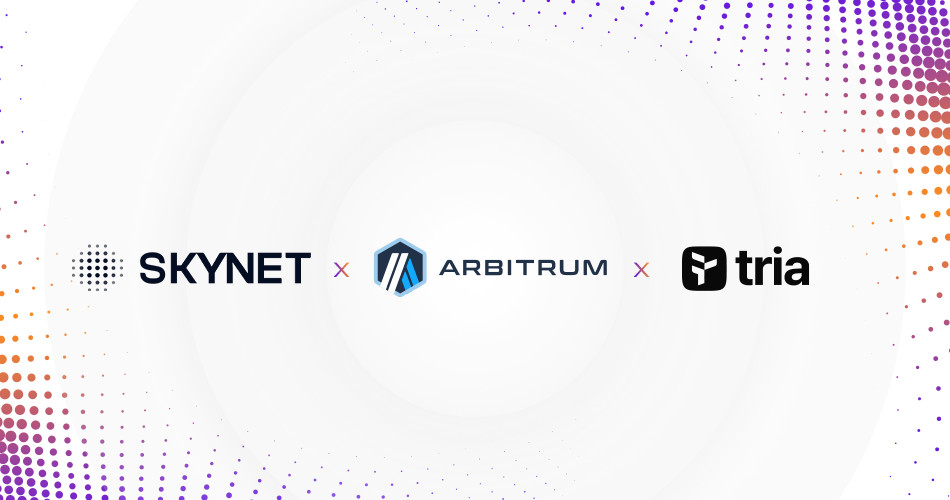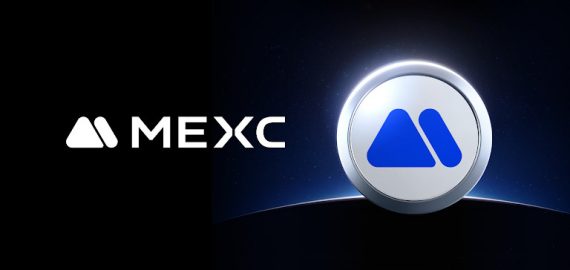Skynet and Tria Collaborate to Unlock the Full Capabilities of AI Agents, Utilizing Arbitrum Orbit

December 12, 2024 — Skynet , a decentralized protocol offering global resources on demand for AI agents, and Tria , a user-centric platform simplifying blockchain engagement through chain-abstraction technologies, have announced a partnership aimed at harnessing the potential of AI agents so they can operate independently in the real world. Built on Arbitrum Orbit’s a customizable rollup framework based on Optimistic technology, Skynet and Tria aspire to eliminate obstacles that prevent AI agents from actively participating in various global sectors, empowering businesses globally with immense productivity.
The market for AI agents is rapidly expanding, with projections indicating that by 2030, AI agents could contribute a phenomenal $16 Trillion to the global economy. Prominent figures in technology, such as Mark Zuckerberg, envision a scenario where AI agents outnumber the human populace, leading the charge in ideation, research, and resolving complex logistical challenges across multiple sectors, including finance, healthcare, and e-commerce. Nevertheless, despite predicted significant investment in the sector, AI agents encounter critical roadblocks. billions of dollars AI agents currently lack the capability to perform meaningful actions in the physical world due to their restricted access to functional resources. Tasks such as acquiring API keys, navigating OAuth configurations, or fulfilling KYC processes often necessitate human assistance. The disarray between various systems results in vital resources for AI agents—including payment gateways, identity services, checkout processes, and authentication services—being dispersed across isolated platforms and chains. This fragmentation, compounded by their lack of access to financial tools like bank accounts and credit cards, forces AI agents to depend on intermediaries, which in turn limits their autonomy.
To tackle these hurdles, Skynet offers on-demand global resources for AI agents via its Smart Access Points, allowing them to leverage services from any web2 or web3 organization—be it Booking.com, AWS, StackAI, MakeMyTrip, or Shopify—while engaging transparently and independently with service providers. Skynet’s versatile payment options, operating as an Orbit chain on Arbitrum, enable AI agents to conduct transactions autonomously, settling in USD or stablecoins, while managing spending through resource-type limits.
To bridge the system fragmentation, Tria’s chain-abstraction interface allows agents to access assets, perform transactions, and connect with decentralized applications (dApps) across various virtual machines (VMs) without the need for multiple wallets, gas tokens, or bridging solutions. This fosters seamless interactions across various blockchains and broadens AI agents' accessibility to numerous services.
Tria’s BestPath AVS technology guarantees that agents always identify the most efficient routes within diverse blockchain ecosystems, boosting their adaptability and operational efficiency. Its integrated gas abstraction layer enables transactions using tokens from any blockchain, eliminating payment roadblocks, simplifying operations, and paving the way for an AI-driven economy that fosters innovation across multiple industries.
This partnership opens a wealth of potential applications. In the travel sector, for instance, AI agents can efficiently book accommodations and organize itineraries across various platforms, providing users with a smooth experience. Similarly, in logistics and supply chains, they can retrieve cross-chain data, optimize delivery routes, manage inventory, and track shipments with ease. In financial services, AI agents are capable of interacting with DeFi ecosystems to autonomously manage investment portfolios and maximize returns. In healthcare, they can coordinate patient appointments and securely share medical data through decentralized networks, enhancing care while alleviating administrative pressures.
The combination of Skynet’s robust resource and payment infrastructure with Tria’s state-of-the-art chain abstraction and interoperability solutions creates a cohesive and scalable environment that empowers AI agents. By capitalizing on the advanced technology of Arbitrum Orbit, which allows for maximum flexibility and modularity, the collaboration among Skynet, Tria, and Arbitrum is setting the stage for AI agents to break free from their limitations and realize their complete potential.
Developed by DeCloud Labs and built on Arbitrum Orbit, Skynet serves as the world’s resource blockchain, providing a decentralized framework that allows AI agents to autonomously access global resources. Through its Smart Access Points, Skynet equips AI agents with the ability to leverage services across any web2 or web3 organization, fostering transparent and autonomous interactions with resource providers while facilitating transactions. This lays the foundation for an AI-centric economy characterized by autonomy, scalability, and efficiency that drives innovation across various sectors. For further information about Skynet, please visit their
###
About Skynet
Tria is designed to streamline blockchain interactions, offering an unbiased chain-abstraction interface that permits users to access assets, perform transactions, and interact with applications (dApps) across all virtual machines (VMs) without the need for multiple wallets, bridging, gas tokens, or other interoperability tools. Central to Tria’s innovation is the BestPath AVS (AVS), a permissionless marketplace for intents developed by Pathfinders that aims to optimize cross-chain or VM interactions while enhancing the user experience. For more details about Tria, please check their website or follow them on X .
About Tria
Arbitrum represents a suite of customizable and interoperable solutions aimed at integrating businesses and individuals onchain. Its premier blockchain, Arbitrum One, leads in L2 total value locked (TVL), boasting substantial liquidity and optimized deployment features that fuel dApp innovation across DeFi, DePIN, gaming, and other sectors. Additionally, technologies such as Orbit, which enables the creation of customizable, interconnected chains within the Arbitrum ecosystem, and Stylus, which supports Rust and C++, position Arbitrum at the forefront of trailblazing progress in blockchain technology. website and follow them on X .
About Arbitrum Foundation
, please understand that the information contained on this page is not meant to serve as legal, tax, investment, financial, or any other advisory content. It's crucial to only invest what you can afford to lose and seek independent financial guidance when in doubt. For additional insights, we recommend reviewing the terms and conditions along with the help and support sections offered by the issuer or advertiser. MetaversePost is devoted to delivering accurate and impartial news, though market conditions are subject to change without prior notice.
Disclaimer
In line with the Trust Project guidelines Meet Gregory, a digital nomad from Poland who is not only a financial analyst but also a prolific writer for numerous online publications. With extensive experience in the finance sector, Gregory has earned accolades for his informed insights featured in various outlets. In his free time, he's dedicated to authoring a book that delves into cryptocurrency and blockchain.







